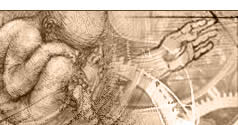 |
 |
 |
 |
 |
 |
 |
 |
|
 |
 |
 |
68 Evolutionary psychology
|
| Menu | back |
For a number of years, public media have offered many popular scientific contributions in which human and animal behaviour are explained in context with the evolution theory. This frequently involves studies regarding human sexual behaviour. However, many conclusions on the evolutionary formation of cognitive mechanisms have proven to be circular arguments. Others are formulated so vaguely and with so little differentiation that they can only be considered stories which sound plausible; however, they cannot be confirmed or contradicted.
What purpose does the female orgasm serve? Is the frequency of orgasms higher for women who have a partner with a high income? How have mental phenomena such as affection and concern for ones own children developed? Is our brain the product of a long process of adaptation?
Questions such as these are treated based on evolution theory and can be answered plausibly on various occasions. Philosophers and theologians who believe in God proceed in a similar manner when they support their religious opinions using a model of a world created by God based on the Bible or other documents. In both cases, it is hardly possible to speak of proof in its actual sense.
Definition and history of evolutionary psychology:
Evolutionary psychology is a branch of research that attempts to explain the origin of the human psyche using evolution. Evolutionary psychology is not limited in terms of contents. On the contrary, it is intended to provide a new methodical approach to psychology as a whole. It is applicable for every branch of psychology (1).
In evolutionary psychology, classical psychological data continue to play a major role. However, this data is supplemented, for example, by assumptions on human evolution, hunter and collector studies or economic models. Some considerations go back to Charles Darwin; however, an independent and influential approach to evolutionary psychology evolved only in the early 1990s as a result of cooperation between psychologist Leda Cosmides and anthropologist John Tooby (2).
An example of creation psychology:
If the faces of several hundred women are captured tri-dimensionally, and then an average face calculated, a woman appears who is generally described as immaculately beautiful. The tendency to choose an attractive partner could be interpreted as a type of creation psychology, which would create every type of life according to its kind and in which individuals attempt to maintain their own kind on the average.
This would lead us to expect an evolutionary behaviour that showed no tendency whatsoever or any experimental desire to develop in new, extraordinary directions.
These 69 | Menu |
back
|
References:
|
| (1) |
Aaron Sell, Edward H. Hagen, Leda Cosmides und John Tooby, Evolutionary Psychology: Applications and Criticisms, inLynn Nadel´s Encyclopedia of Cognitive Science, John Wiley & Sons, Hoboken, 2006, page 54. |
| (2) |
Jerome H. Barkow, John Tooby, Leda Cosmides, The Adapted Mind: Evolutionary Psychology and The Generation of Culture, Oxford University Press, Oxford, 1992. | |
| |
Comment this Site!
|
 |
 |
 |
 |
|

